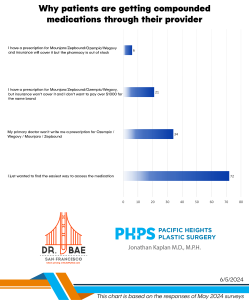A rhinoplasty, or nose job, comes in all shapes and sizes, various techniques with different outcomes. It’s a complicated procedure for a very unique part of the face. Any deviation from the norm is quickly recognized due to the aesthetic importance of the nose and it’s relation to the face. So how do you correct the nose to meet the patient’s expectations?
There is an open rhinoplasty and a closed rhinoplasty. A more in depth discussion can be found here, but essentially the difference is the need for an incision/scar on the outside of the nose to complete an open rhinoplasty or incisions only on the inside of the nose for a closed rhinoplasty. As you will see below, a great deal of work can be done on the nose with the closed rhinoplasty technique. It’s amazing how many issues can be addressed with absolutely no scars to the outside of the nose!
 In this patient, her concerns were the hump on the bridge of her nose, the way the tip of her nose hung down and also her inability to breathe through her left nostril. You might think it necessary to make an incision on the outside of the nose to get a good look at “what’s under the hood” to fix all of these issues. But in fact, it’s possible, and maybe even better for the patient to correct the nose in this situation with a closed technique.
In this patient, her concerns were the hump on the bridge of her nose, the way the tip of her nose hung down and also her inability to breathe through her left nostril. You might think it necessary to make an incision on the outside of the nose to get a good look at “what’s under the hood” to fix all of these issues. But in fact, it’s possible, and maybe even better for the patient to correct the nose in this situation with a closed technique.

With incisions on the inside of the nose, the bump on the bridge of the nose can be rasped down and through a separate incision the septum that divides the nostrils, and affects breathing, can be corrected. By reducing the bump on the nose, it allowed the tip of the nose to rotate up, thereby alleviating the patient’s concern about her hanging nasal tip. Concerns about the tip sometimes have to be corrected with an open rhinoplasty but this was accomplished in this case with a closed rhinoplasty. Two incisions within the nose addressed this patient’s concerns and met her expectations.
Are you a candidate for this procedure? Find a board certified plastic surgeon near you and check pricing here.
Click here for the original blog post written by Dr. Jonathan Kaplan for BuildMyBod.




